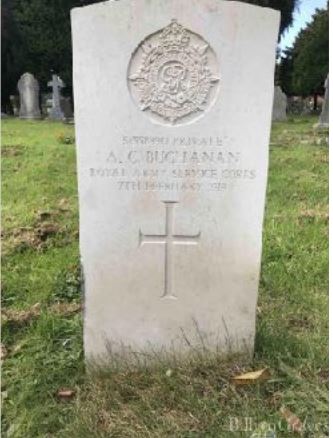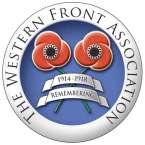878th Horse Transport Company, Royal Army Service Corps

Regrettably I have been unable to establish Andrew Charles Buchanan’s parentage but know he had at least two siblings, Robert and James. Although no age was given on the Commonwealth War Graves Commission (CWGC) records or his memorial, based on the cemetery record Andrew would have been born c1888.
He lived in Gorsley, Ross-on-Wye, and on Saturday 15 September 1917 he was arrested and charged with the murder/manslaughter of his brother, James Scott Buchanan of Hillside, Gorsley, aged 44 years. Based on the fact he was in the military within the following two years, it could be assumed he was acquitted of the charge.
Andrew served in the 878th Horse Transport Company, Royal Army Service Corps (RASC), part of the 42nd Division, Larkhill whose role was to train Home Service Personnel for local duties. It was formed on 1 February 1917 and disbanded on 31 March 1920. The RASC supplied food, equipment and ammunition for those serving in the Great War, and the prefix ‘S’ before his service number denotes he was in the Supply Section. The ASC received the Royal prefix in 1918. As his theatre was in the UK, he would not have been entitled to any war medals.
Andrew died on 7 February 1919 at Fargo Military Hospital, Larkhill, Salisbury Plain, and he was buried on 13 February in grave number 1021 in Newent Cemetery. The cemetery records state he was aged 31 years.
It is worth pointing out that the cemetery off Watery Lane is not adjacent to St Mary’s Church, which is situated in Church Street in the town centre.
His probate stated he was resident at 24 Gladstone Road, Seacombe, Wallasey, Cheshire and that he died at Durrington Camp, Larkhill, Salisbury on 7 February 1919. His brother Robert, a Labourer of 3 Grosvenor Place, Borough Road, Seacombe was granted Probate Administration for his brother and he also received a war gratuity on 19 February 1920.
A training camp for the artillery was established at Fargo on the Salisbury Plain in 1904, and grew to include medical units. In July 1914, just before the outbreak of the war, the Royal Army Medical Corps started work on the construction of the 1200-bed Fargo Military Hospital.
An area surrounding Larkhill supported 34 individual infantry training areas, including Durrington Camp where Andrew was based. It is assumed he was transferred to Fargo Military hospital before his death.
The records for Andrew have been elusive and, in addition, I have not been able to find him commemorated on any War Memorial or Roll of Honour.
(Andrew’s memorial has been uploaded to BillionGraves so anyone downloading their app will be able to locate it by GPS.)
Researched by Baden Russell October 2020
